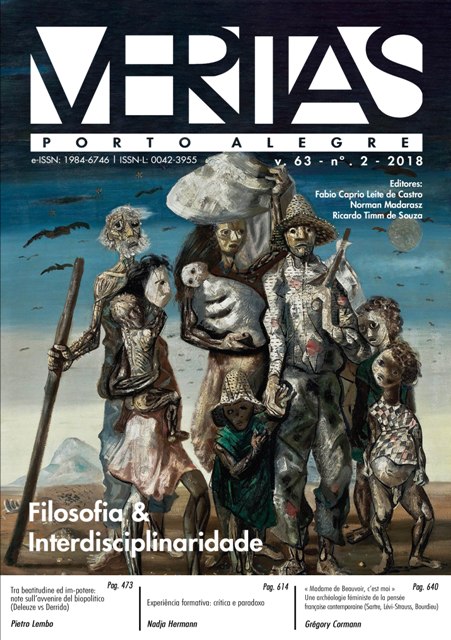The Culture Industry and Its Vicissitudes: between concept and reality
DOI:
https://doi.org/10.15448/1984-6746.2018.2.32137Keywords:
culture industry, domination, subjectivity, reification, critical theoryAbstract
In this article, I intend to discuss some aspects concerning the different researchers and reflections about the concept of cultural industry that I have studied in recent years. The central question is the thinking of Theodor W. Adorno with special attention to the current situation of his negative dialectics. My argumentation about the current situation of culture industry concept has three steps: the inseparability between rationality and domination as the basis of Adorno’s social theory; some rearrangements in contemporary capitalism and its implications for a culture industry concept in the 21st century and; the placement of culture industry in the context of Brazilian Sociology. The central aim of this article, written as in the essay form, is to emphasize the current situation of Theodor Adorno’s critical theory of society through specific arguments to the field of Sociology.Downloads
References
ADORNO, Theodor W. Dialética Negativa. Madrid: Taurus: 1984.
________. Tres Estudios sobre Hegel. Madrid: Taurus: 1981.
________. La Disputa del Positivismo en La Sociología Alemana. México: Grijalbo: 1973.
________. Introdução à Sociologia. São Paulo: Ed. Unesp: 2007.
________. Minima Moralia. Rio de Janeiro: Azougue: 2008.
________ & HORKHEIMER, Max. Dialética do Esclarecimento. Rio de Janeiro: Zahar: 1985.
ALEXANDER, Jeffrey. O Novo Movimento Teórico. Revista Brasileira de Ciências Sociais, n. 4, vol, 2.1987. pp. 5-28.
BOLAÑO, César Ricardo Siqueira e BRITTOS, Valério Cruz. A Televisão brasileira na Era Digital. São Paulo: Paulus, 2007.
CAMARGO, Sílvio. Modernidade e Dominação – Theodor Adorno e a Teoria Social Contemporânea. São Paulo: Annablume/Fapesp: 2006 a.
______. Axel Honneth e o Legado da Teoria Crítica. Revista Política & Trabalho nº 24. João Pessoa, 2006 b.
_______. Trabalho Imaterial e Produção Cultural – a dialética do capitalismo tardio. São Paulo: Annablume: 2009.
_______. Experiência Social e Crítica em André Gorz e Axel Honneth. Revisa Brasileira de Ciências Sociais. Vol. 25, 2010 a. pp. 107-120. DOI: https://doi.org/10.1590/S0102-69092010000300007
_______. Trabalho Imaterial, cultura e dominação. Liinc em Revista, vol. 6, n. 1, 2010 b. pp. 6-21.
_______. Itinerários da teoria crítica na sociologia brasileira. In: SILVA, J. P. (org.). Sociologia crítica no Brasil. São Paulo: Annablume. 2012. pp. 155-86.
________. Teoria Crítica e Dominação na obra de Moishe Postone. Mediações; Vol. 18, n. 2, 2013. pp. 118-132. DOI: https://doi.org/10.5433/2176-6665.2013v18n2p118
________. Os primeiros anos da “Escola de Frankfurt” no Brasil. Lua Nova, 91, 2014. pp. 105-133. DOI: https://doi.org/10.1590/S0102-64452014000100005
________. Nota sobre Theodor Adorno na Sociologia Brasileira. In: ZUIN, Álvaro Soares; LASTÓRIA, Luiz Antônio Calmon Nabubo; FRANCO, Renato (Orgs.). Teoria Crítica no Brasil e na América Latina. São Paulo: Nankin: 2016. pp. 175-188.
________. A teoria crítica na multiplicidade de suas vozes. In: CAMARGO, Sílvio e SILVA, Josué Pereira da. A teoria crítica na multiplicidade de suas vozes. São Paulo: Annablume. 2017. pp. 17-31.
COHN, Gabriel. Weber, Frankfurt. Teoria e pensamento social I. Rio de Janeiro: Azougue editorial: 2017.
DURÃO, Fábio Ackelrud; ZUIN, Antonio; VAZ, Alexandre Fernandes (Orgs.) A Indústria Cultural Hoje. São Paulo: Boitempo, 2008.
KANT, Imannuel. Resposta à pergunta: o que é o Aufklärung? In: Textos Seletos. Petrópolis: Vozes: 1985.
LAZZARATO, Maurizio e NEGRI, Antonio. Trabalho Imaterial. Rio de Janeiro: DP & A editora: 2001.
HABERMAS, Jürgen. Teoria de La Acción Comunicativa. Tomo I - "Racionalidad de la acción y racionalizacion social". Taurus: Madrid: 1987 a.
______. Teoria de La Acción Comunicativa. Tomo II - "Crítica de la razón funcionalista". Taurus: Madrid: 1987 b.
HESMONDHALGH, David. The Cultural Industries. London: Sage, 2007.
HONNETH, Axel. The Critique of Power. Reflective Stages in a critical social Theory. London: The MIT Press:1991.
_______. Luta por Reconhecimento. A Gramática Moral dos Conflitos Sociais. São Paulo: Ed. 34: 2003.
_______. Reification. A new look at an old idea. New York: Oxford University Press: 2008.
HORKHEIMER, Max. Crítica da la razón instrumental. Buenos Aires: Sur: 1969.
_______. Teoria Tradicional e Teoria Crítica. Col. “Os Pensadores”: São Paulo: Abril Cultural: 1983. Pp.117-154.
JAMESON, Fredric. Pós-Modernismo. A Lógica Cultural do Capitalismo Tardio. São Paulo : Ática: 1997.
LASH, Scott and LURY, Celia. Global Culture Industry. Cambridge: Polity Press: 2007.
LUKÁCS, Georg. História e Consciência de Classe. Lisboa: Escorpião: 1986.
MARCUSE, Herbert. Razão e Revolução. Rio de Janeiro: Paz e Terra: 1978.
MARX, Karl. O Capital. Vol. I. São Paulo: Nova Cultural: 1985.
_______. Grundrisse: Foundations of the Critique of Political Economy. Middlesex: Penguin Books: 1989
MOULIER-BOUTANG, Yann. Le Capitalism Cognitif. Paris : Éditions Amsterdam: 2007.
ORTIZ, Renato. A Moderna Tradição Brasileira. São Paulo: Brasiliense: 1988.
SCHWARZ, Roberto. Um seminário sobre Marx. Novos Estudos Cebrap, n. 50, março/1998. p. 99-113.
Downloads
Published
How to Cite
Issue
Section
License
Copyright
The submission of originals to Revista Veritas implies the transfer by the authors of the right for publication. Authors retain copyright and grant the journal right of first publication. If the authors wish to include the same data into another publication, they must cite Revista Veritas as the site of original publication.
Creative Commons License
Except where otherwise specified, material published in this journal is licensed under a Creative Commons Attribution 4.0 International license, which allows unrestricted use, distribution and reproduction in any medium, provided the original publication is correctly cited. Copyright: © 2006-2020 EDIPUCRS</p






